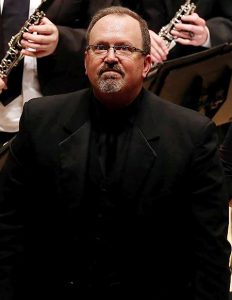Candidate Scott Lubaroff

University of Central Florida
Director of Bands
Biographical Statement with CBDNA Involvement
I have been teaching instrumental music now for 31 years, 25 of those at the collegiate level. I
have been fortunate to meet and collaborate with some of the finest people – conductors,
composers, performers, and educators – through many initiatives in those three decades. For
16 years I have hosted an annual Conductors Symposium – first at the University of Central
Missouri (UCM) and since at the University of Central Florida (UCF), bringing conductors of all
levels and depths of experience from across the U.S. and abroad to work to better themselves
as conductors and artists, and have been fortunate to share some of our profession’s finest
artists on the podium with our participants. I have attended CBDNA conferences – both division
and national – as faithfully as possible, and have twice been fortunate enough to have
performed. In 2014, my UCM Wind Ensemble was selected to perform for the Southwestern
Division Conference at the University of Arkansas, and in 2020, my UCF Wind Ensemble
performed for the Southern Division Conference at Northwestern State University in Louisiana.
On both programs world premieres were included on our program, as I feel strongly that one of
the most important things that we do is to further augment our repertoire. I have been deeply
involved in the commissioning and premieres of new works for wind band and for chamber
wind ensembles for 25 years, and in doing so feel proud of the new works that we have been
able to add to our repertoire and for the opportunities I have had to collaborate with some of
our finest composers, including Jim Stephenson, John Frantzen, Scott McAllister, Steven Bryant,
Keane Southard, Bob Mintzer, Robert Beaser, Joanne Metcalf, and others, and I hope to
continue doing so, introducing the artistic potential of the wind band to new composers, as
well. From 2013-2015, I served on the CBDNA Committee on Wind Music as a Social Force and
participated on a panel for a special topics breakout session at the 2010 Southwestern Division
Conference in Las Cruces, New Mexico, and I intend to submit a research presentation proposal
for consideration for the 2023 National Conference at the University of Georgia that is an
augmentation of the one that I will be giving at the 2023 WASBE Conference in Prague. From
2007-2017 I also served as the Missouri CBDNA State Chair. I have been fortunate to have been
invited for several conducting and teaching engagements in Southeast Asia, specifically in
Thailand and South Korea, and I hope to continue doing so, even perhaps augmenting some of
those partnerships in ways that might explore potential partnerships with individuals or
elements of the CBDNA.
Vision for the Future of CBDNA
I am very proud of the overall direction of the national CBDNA organization and of the
organization itself. I feel that we have embraced the opportunities and responsibilities that
have been presented to us to be leaders and advocates in our profession along varied avenues
and to make strong contributions to our communities, whether they be our individual
immediate communities or those associated with our professional and pedagogical activities. I
hope that the CBDNA can continue to embrace and even further explore the opportunities
before us as leaders and as examples. We have, I think, become a more open organization and
in doing so we have reached out. We have engaged further with our colleagues in the American
secondary schools and I hope that we can continue to develop that sort of symbiotic
relationship, sharing resources in the areas of repertoire development and selection,
commissioning, pedagogy, performance practice, scholarship, professional development, and
other. We have also become a more inclusive organization in embracing consideration of
diversity, equity, and inclusion, and I hope that we can continue to lead in this crucial position –
not only in examining programming practice, but also in educating and informing our own
communities and also in advocating for best practices in hiring practices and in methodology
and pedagogical practice. Of course, we have engaged composers in ever-increasingly artistic
projects and this is very much at the core of what we do. I hope that we can continue to bring
the same sorts of inclusivity, outreach, and creativity to this as to those areas that I’ve just
described. Finally, having engaged in various conducting and teaching initiatives internationally
– specifically in southeast Asia – I see many opportunities for the CBDNA to even further
engage in sharing the art, pedagogy, and “culture,” as it were, of the wind band in extremely
meaningful ways through partnerships with international schools and organizations. There is, I
believe, a strong desire to learn more about and to implement education in the history and
development of repertoire for mixed winds & percussion, conducting technique & pedagogy,
programming & performance practice, and more, and I find it a very exciting platform that the
CBDNA could explore in growing as a greater international resource through any number,
shape, and size of collaborations, including, of course, potential further interfaces with WASBE.